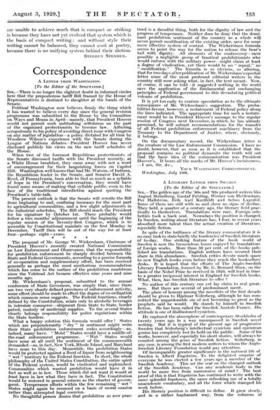Correspondence
A LETTER FROM WASHINGTON. [To the Editor of the SPECTATOR.] SIR,—There is no longer the slightest doubt in informed circles here that the preposterous tariff Bill framed by the House of Representatives is destined to slaughter at the hands of the Senate.
Political Washington now believes firmly the thing which it has wanted to believe every day since the general revision programme was submitted to the House by the Committee on Ways and Means in April—namely, that President Hoover would not permit such unblushing selfishness on the part of the organized protectionists to become law. Adhering scrupulously to his policy of avoiding direct issue with Congress on any matter of legislation—a policy dictated for all time by Woodrow Wilson's experience with the Senate during the League of Nations debates—President Hoover has never disclosed publicly his views on the new tariff schedules of the House.
When two of the foremost Republican protectionists of the Senate discussed tariffs with the President recently, at a White House breakfast, they came away with not a word of encouragement for their languishing forces on Capitol Hill. Washington well knows that had Mr. Watson, of Indiana, the Republican leader in the Senate, and Senator David A. Reed, of Pennsylvania, been able to find so much as a syllable of hope in the President's conversation, they would have found some means of making that syllable public, even in the face of the traditional interdiction against quoting the President's table-talk.
The present outlook is that the Senate will rewrite the Bill from beginning to end, confining increases for the most part to agricultural commodities, and a few slight adjustments in the industrial schedules. The Bill should reach the President for his signature by October 1st. There probably would follow a two months' adjournment until the beginning of the regular session of the Seventy-first Congress, which is to assemble by Constitutional mandate on the first Monday in December. Tariff then will be out of the way for at least four—perhaps eight—years.
The proposal of Mr. George W. Wickersham, Chairman of President Hoover's recently created National Commission on Law Enforcement and Observance, that the responsibility for prohibition enforcement be sharply divided between the State and Federal Governments, according to a precise formula of co-operation and supplementary effort, has been received generally as perhaps the most meritorious recommendation which has come to the surface of the prohibition maelstrom since the Volstead Act became effective nine years and nine months ago.
Mr. Wickersham's proposal, submitted to the annual conference of State Governors, was simply that, since there are two very clearly defined provinces of enforcement activity, some effort should be made to effect the degree of co-ordination which common sense suggests. The Federal functions, clearly defined by the Constitution, relate only to alcoholic beverages in interstate commerce—shipment from State to State, bo er patrol, custody of medicinal supplies. To the several States clearly belongs responsibility for police regulations within the. State borders.
What a happy solution this formula would offer ! States which are preponderantly " dry " in sentiment might write their State prohibition enforcement codes accordingly—as, indeed, many have. "Moist" States would have a middle-of- the-road enforcement programme. " Wet " States would have none at all until the sentiment of the commonwealth demanded—as, in fact, New York, Rhode Island, and Maryland have none to this day. Meanwhile, the prohibition States would be protected against a flood of liquor from neighbouring " wet " territory by the Federal function. In short, the whole 'philosophy of the United States Constitution, the entire spirit of the Federal system, would be vindicated and replenished. Communities which wanted prohibition would have it in fact as well as in law. Those which did not want it would at least have in law what they have in fact. The Constitution Would be restored in general esteem as the charter of govern- sient. Temperance efforts within the few remaining wet " States might again be resumed on a basis of moral suasion rather than attempted legal coercion. No thoughtful person denies that prohibition as now prac- tised is a dreadful thing, both for the dignity of law and the progress of temperance. Neither does he deny that the domi- nant prohibition sentiment of the country as a whole wit' never permit modification of the existing order, save for some more effective system of control. The Wickersham formula seems to point the way for the nation to release the bear's tail with dignity. All elements of the controversy—save possibly a negligible group of fanatical prohibitionists who would enforce with the military power—might claim at least a degree of vindication, yet there would be no repeal," no " modification." The formula is so obvious, so alluring, that for two days after publication of Mr. Wickersham's epochal letter some of the most profound editorial writers in the country still were asking what, in fact, the text meant. Now, of course, it can be told—it suggested nothing in the world save the application of the fundamental and unchanging principles of Federal government to this devastating political volcano of prohibition.
It is yet too early to venture speculation as to the ultimate conserinence of Mr. Wickersham's suggestion. The proba- bilities favour, however, a restatement of Federal policy along the lines indicated. The appropriate time for such a restate- ment would be in President Hoover's message to the regular session of Congress next December, in which, he has already promised, he will submit recommendations for the transfer of all Federal prohibition enforcement machinery from the Treasury to the Department of .Justice, where, obviously, it belongs.
On the documentary record, the Wickersham letter is the creature of the Law Enforcement Commission. I have no ,doubt, however, that as soon as it is established that the proposal contains no political dynamite the truth will out that the basic idea of the communication was President Hoover's. It bears all the marks of Mr. Hoover's incisiveness, —I am, Sir, &c.,


































 Previous page
Previous page